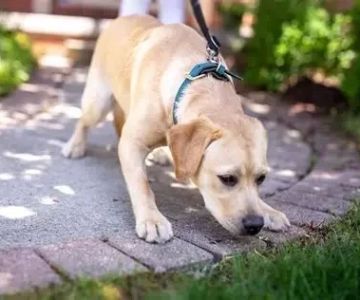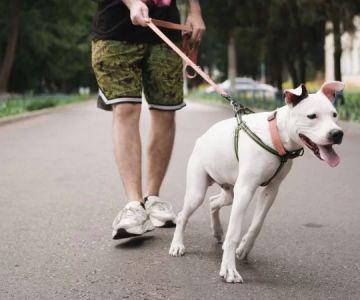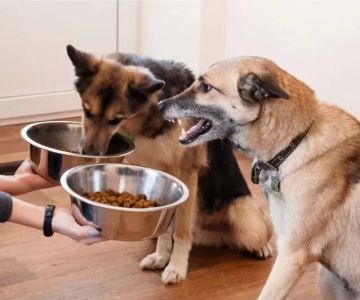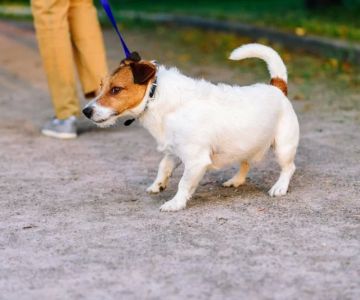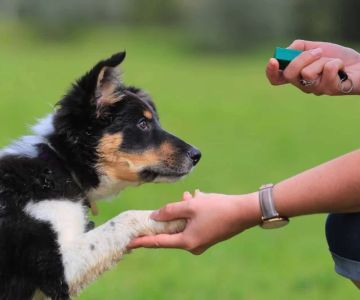How to Stop a Dog from Stealing Food: Tips and Solutions
As a dog owner, one of the most frustrating behaviors to deal with is a dog that steals food. I’ve had my share of food-stealing incidents, whether it was a piece of pizza left on the counter or a plate of cookies that disappeared too quickly. Over time, I learned some effective ways to stop this behavior and make mealtime more peaceful for both my dog and me. In this article, I’ll share my personal experience and provide tips to help you stop your dog from stealing food.

1946 S Christopher Columbus Blvd, Philadelphia, PA 19148, USA
See Details1. Understand Why Dogs Steal Food
The first step in addressing food-stealing behavior is understanding why dogs do it. In my experience, dogs steal food for several reasons:
- Hunger or Food Curiosity: Sometimes, dogs steal food simply because they are hungry or curious. If your dog is always sniffing around the kitchen or getting into your food, it could be due to an unbalanced diet or not enough food during mealtime.
- Instinctual Behavior: Dogs are scavengers by nature, and their instinct is to take food when it’s available. This is especially true if they’ve learned that stealing food results in a reward—whether that’s a tasty snack or simply attention.
- Lack of Training: Many dogs develop the habit of stealing food because they haven’t been trained not to. If you haven’t set boundaries early on, your dog might see food stealing as a normal behavior.
2. Set Clear Boundaries and Rules
One of the most important steps in stopping your dog from stealing food is setting clear boundaries. When I started to address my dog’s food-stealing habits, I made sure to establish rules that were consistent and enforced by everyone in the household. This included not allowing my dog access to the kitchen or dining area while I was eating, and not giving in when my dog begged for food.
Consistency is key. If you give your dog food from the table or the counter sometimes, but not others, it will confuse them and make the stealing behavior harder to correct. By enforcing the same rules every time, your dog will start to understand what’s allowed and what isn’t.
3. Keep Food Out of Reach
The easiest way to stop a dog from stealing food is to make sure it’s not accessible. In my home, this meant being more mindful about leaving food unattended. I started keeping food off counters, tables, and the edge of surfaces. I also made sure to store food in cabinets and sealed containers to avoid tempting my dog.
It’s also important to train your dog to avoid counters and tables. This might take some time and patience, but it’s an effective way to eliminate the temptation altogether. If your dog is particularly persistent, consider using deterrents like aluminum foil or a scent that they dislike near food areas. This can help discourage them from approaching food left on the counter.
4. Provide Proper Training
Training is an essential part of stopping food-stealing behavior. I found that teaching my dog basic commands like “leave it” and “stay” helped tremendously. When my dog started to show interest in food that wasn’t theirs, I would say “leave it,” and reward them when they obeyed. This helped them associate the command with a positive experience, and over time, they began to understand that ignoring food was the right thing to do.
Positive reinforcement is key. When your dog resists the urge to steal food, be sure to praise them with treats or affection. This reinforces the behavior and makes it more likely to occur in the future. Training requires patience, but it’s incredibly effective in curbing food-stealing behavior.
5. Ensure Your Dog Gets Enough Exercise
Sometimes, a dog steals food simply because they’re bored or under-exercised. I found that increasing my dog’s daily activity helped reduce the urge to seek out food in the kitchen. Dogs need both physical and mental stimulation to stay happy and healthy, so make sure you’re providing them with enough exercise, playtime, and engagement.
Regular walks, play sessions, and interactive toys can help keep your dog occupied and less likely to turn to food stealing as a form of entertainment. If your dog is more tired and content, they will be less focused on food that’s left unattended.
6. Use Food Puzzles and Slow Feeders
If your dog is stealing food due to hunger or a lack of stimulation, consider incorporating food puzzles and slow feeders into their routine. These tools challenge your dog to work for their food, keeping them engaged and satisfied for longer periods. I’ve found that my dog loves food puzzles, and it’s a great way to redirect their attention from my meals to their own designated food time.
Slow feeders, which require your dog to eat more slowly, can also help prevent them from becoming overly eager during mealtime. These feeders also help with digestion, making them a great addition to your dog’s feeding routine.



